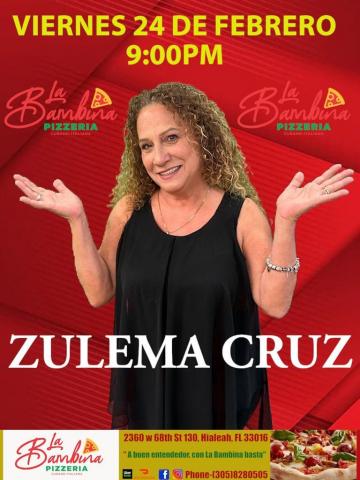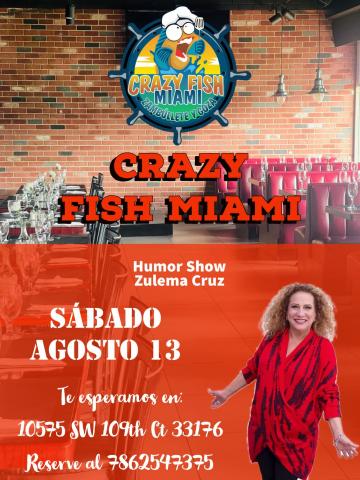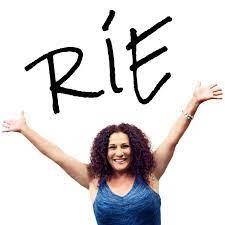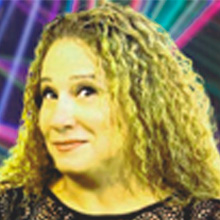Hoy me doy el placer de tener este vis a vis con una colega. Bueno, más bien con una amiga. No, mejor con una hermana: Zulema Cruz.
La conocí hace más de 40 años. Ella era miembro del Conjunto Nacional de Espectáculos que dirgía Virulo. Por ella descubrí a Les Lutheirs en un cassette pegado unas cuantas veces con scoch. Con ella subí la pirámide Chichén Itzá, en México. Por ella disfruté de su personaje de la esclava Isaura, de la guía de museo, de sus entrevista a estrellas en la TV mexicana, de sus monólogos, de sus chistes.
Zulema es una de las mejores comediantes cubanas de todos los tiempos. Es la versión femenina de Guillermo Álvarez Guedes. En fin, hace del humor lo que quiera.
Lo ha demostrado en Cuba, México, Miami, Dominicana, entre otros países.
Además, es amable, generosa, acogedora, sociable, sincera, transparente, y para mí algo muy importante: tremenda amiga.
Con esa presentación tan emotiva, paso al vis a vis…
PP: Dime una cosa, Zule, ¿a ti te gusta que te hagan entrevistas?
ZULEMA: ¡¡¡Síííí!!!!
PP: ¡Wow! Me gustó ese entusiasmo. Pues comencemos rápido entones. Mira, en este año 2011, ¿cómo ves el estado actual de humor en Miami, Estados Unidos, donde vives, en televisión, radio, teatro, literatura y gráfica?
ZULEMA: En Estados Unidos está muy bueno. En Miami está muy malo.
PP: Te gustan que te hagan preguntas en las entrevistas, pero no te gusta responderlas muy extensamente, ¿no? No voy a insistir, porque sé a qué te refieres. Pero dime, en varios países de América Latina se dice: "Mi país es un pueblo de humoristas", "en mi país, tú mueves una piedra y sale un humorista", etc. ¿Ahí en Estados Unidos se dice lo mismo?
ZULEMA: Este país es muy grande. Solo puedo hablar de Miami y sus alrededores y no se dice eso. Y los cubanos aquí solo añoran Cuba y recordamos lo bueno que era el humor en Cuba.
PP: Bueno, la época que nos tocó vivir allá en Cuba como humoristas fue muy especial y excepcional. Lo explico a los lectores que Cuba siempre ha dado excelentes humoristas en todas las manifestaciones artísticas, pero aislados, como individuos en sus respectivos medios (teatro, radio, televisión, prensa), pero lo que ocurrió en la década del 80 del siglo XX fue un fenómeno extraño. Primero apareción el Conjunto Nacional de Espectáculo, donde pertenecía nuestra querida Zulema y además estaban Carlos Ruiz de la Tejera, Jorge Guerra, Tatica, Ana Lydia Méndez, Eduardo Rómulo y grupo de baile, todos dirigidos por Virulo. Pero después surgió el grupo La Seña del Humor de Matanzas, con miembros recién graduados de diferentes carreras universitarias y hacciendo un humor nuevo, fresco, rupturista, inteligente, que provocó el nacimiento de muchos grupos a lo largo del país, la mayoría compuestos por estudiantes universitarios y recién egresados, haciendo ese tipo de humor. Fue, como decía, una época de oro en el humor escénico cubano, ya que nunca se había dado tantos humoristas al mismo tiempo y de manera nacional. Dicho eso, se entiende que los cubanos en Miami añoren ese humor que se hacía en Cuba. Pero sigo, Zule. Dime ahora, ¿para ti, es verdad la acuñada frase: "Es más fácil hacer llorar que hacer reír”?
ZULEMA: Sííí, claro que es verdad.
PP: Vuelves a demostrar entusiasmo y eso es bueno. Pero también sigues demostrando tan poca locuacidad que me haces dudas ya de si me va a salir buena la entrevista. Y ahora confiésate, ¿cuándo decidiste hacerte humorista?
ZULEMA: La primera vez que fui al teatro y me reí. Ahí dije: ¡esto es lo mío!
PP: ¡Por dios! ¿Quieres que te responda también? ¿Por qué no quieres hablar con lo habladora que eres!! Bueno, te perdono como siempre. Otra pregunta: ¿en tu opinión, el humorista nace o se hace?
ZULEMA: Nace.
PP: ¡Ya llegaste al monosílabo como respuesta! Así que espero que la próxima pregunta no respondas nada. A ver, ¿cuál ha sido el mejor y el peor momento de tu carrera en el humor hasta el día de hoy?
ZULEMA: El mejor: cuando me paré en el Teatro Karl Marx e hice reír a 5,000 personas a la vez. El peor: cuando trabajé en un Club Nocturno en La Habana para latinoamericanos y nadie se rió.
PP: Bueno, eso de hacer reír a 5,000 personas, he sido testigo. Y no un día, sino temporadas completas. Y de la noche que no hiciste reír, ya sabes, con la experiencia que ahora posees, pudieron ser varias las causas. Desde que te equivocaste de repertorio porque hiciste chistes muy locales, o a ese público le había pasado algo ese día, etc., etc. Lo sabes porque has hecho reír a latinoamericanos en sus respectivos países. Pero ¿y tú? como profesional del humor, ¿te ríes fácil? ¿Con qué tipo de chistes?
ZULEMA: No, no me río fácil. Pero sí me río con los chistes que no me sé (algo muy difícil que ocurra).
PP: Eso sí, difícil que no te sepas alguno. Bueno, ¿alguna anécdota relacionada con su profesión?
ZULEMA: Muchas. Llámame y te las contaré con calma, porque son historias y me encanta contarlas.
PP: Gracias, sin dudas lo haré (incluso ya lo he hecho unas cuantas veces), pero no contarlas ahora es otro sabotaje a mi entrevista. Te odio. Vamos a ir cerrando entonces. Dime, ¿con cuáles colegas te identificas?
ZULEMA: Les Luthiers, Betty Miller, Aida (de España), Friends, Woody Alenn, Almodovar, etc.
PP: ¿Qué le aconsejas a un humorista? A mí, por ejemplo.
ZULEMA: Siempre diviértete mientras trabajas.
PP: Sí, me di cuenta. Te has divertido mucho conmigo hoy. Y yo sufriendo… Bueno, en serio ahora, mil graias por tu tiempo y atención. Te deseo mucha salud y éxitos. Y una vez más te digo: ¿te quiero mucho, Zule!!




Interview with Zulema Cruz
By Pepe Pelayo
The first time I went to the theater and I laughed, that's when I said: this is my thing!
Today I give myself the pleasure of “dialocating” with a colleague. Well, more like with a friend. No, better with a sister: Zulema Cruz.
I met her more than 40 years ago. She was a member of the National Entertainment Group directed by Virulo. Because of her I discovered Les Lutheirs on a cassette played a few times with Scoch. With it I climbed the Chichén Itzá pyramid, in Mexico. Because of her I enjoyed her character as the slave Isaura, the museum guide, her interviews with stars on Mexican TV, her monologues, her jokes.
Zulema is one of the best Cuban comedians of all time. She is the female version of Guillermo Álvarez Guedes. In short, make humor whatever you want.
He has demonstrated it in Cuba, Mexico, Miami, the Dominican Republic, among other countries.
PP: You like to be asked questions in interviews, but you don't like to answer them at length, right? I'm not going to insist, because I know what you mean. But tell me, in several Latin American countries it is said: "My country is a town of comedians", "in my country, you move a stone and a comedian comes out", etc. Is the same thing said there in the United States?
ZULEMA: This country is very big. I can only talk about Miami and its surroundings and that is not said. And the Cubans here just long for Cuba and we remember how good the humor was in Cuba.
PP: Well, the time we had to live there in Cuba as comedians was very special and exceptional. I explain to readers that Cuba has always produced excellent comedians in all artistic manifestations, but isolated, as individuals in their respective media (theater, radio, television, press), but what happened in the 80s of the 20th century was a strange phenomenon. First, the National Entertainment Ensemble appeared, where our beloved Zulema belonged and there were also Carlos Ruiz de la Tejera, Jorge Guerra, Tatica, Ana Lydia Méndez, Eduardo Rómulo and a dance group, all directed by Virulo. But then the group La Seña del Humor from Matanzas emerged, with members who had recently graduated from different university careers and created new, fresh, disruptive, intelligent humor, which caused the birth of many groups throughout the country, most of them made up of students. university students and recent graduates, doing that kind of humor. It was, as I said, a golden era in Cuban stage humor, since there had never been so many comedians at the same time and nationally. That said, it is understandable that Cubans in Miami long for that humor that was done in Cuba. But I continue, Zule. Tell me now, for you, is the coined phrase true: "It is easier to make people cry than to make them laugh"?
ZULEMA: Yes, of course it's true.
PP: You show enthusiasm again and that's good. But you also continue to show so little talkativeness that I already have doubts about whether the interview is going to go well. And now tell me, when did you decide to become a comedian?
ZULEMA: The first time I went to the theater and I laughed. There I said: this is my thing!
PP: Oh my god! Do you want me to answer you too? Why don't you want to talk with how talkative you are!! Well, I forgive you as always. Another question: in your opinion, are comedians born or made?
ZULEMA: Born.
PP: You've already reached the monosyllable as an answer! So I hope the next question doesn't answer anything. Let's see, what has been the best and worst moment of your career in comedy to date?
ZULEMA: The best: when I stood at the Karl Marx Theater and made 5,000 people laugh at once. The worst: when I worked in a Nightclub in Havana for Latin Americans and no one laughed.
PP: Well, I have witnessed that thing about making 5,000 people laugh. And not one day, but entire seasons. And the night you didn't make people laugh, you know, with the experience you now have, there could have been several reasons. Since you had the wrong repertoire because you made very local jokes, or something had happened to that audience that day, etc., etc. You know this because you have made Latin Americans laugh in their respective countries. But and you? As a humor professional, do you laugh easily? With what kind of jokes?
ZULEMA: No, no me río fácil. Pero sí me río con los chistes que no me sé (algo muy difícil que ocurra).
PP: Eso sí, difícil que no te sepas alguno. Bueno, ¿alguna anécdota relacionada con su profesión?
ZULEMA: Muchas. Llámame y te las contaré con calma, porque son historias y me encanta contarlas.
PP: Gracias, sin dudas lo haré (incluso ya lo he hecho unas cuantas veces), pero no contarlas ahora es otro sabotaje a mi entrevista. Te odio. Vamos a ir cerrando entonces. Dime, ¿con cuáles colegas se identifica?
ZULEMA: Les Luthiers, Betty Miller, Aida (de España), Friends, Woody Alenn, Almodovar, etc.
PP: ¿Qué le aconsejas a un humorista? A mí, por ejemplo.
ZULEMA: Siempre diviértete mientras trabajas.
PP: Sí, me di cuenta. Te has divertido mucho conmigo hoy. Y yo sufriendo… Bueno, en serio ahora, mil gra ias por tu tiempo y atención. Te deseo mucha salud y éxitos. Y una vez más te digo: ¿te quiero mucho, Zule!!
(This text has been translated into English by Google Translate)

